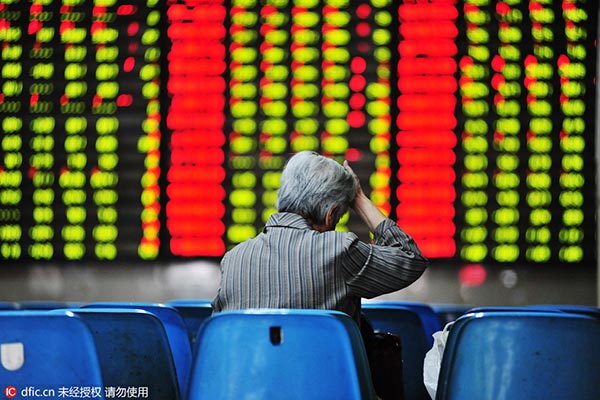Further reform to earn stock index recognition
Updated: 2016-06-16 07:36
(China Daily)
|
|||||||||
 |
|
An Investor looks at an electronic board showing stock information at a brokerage house in Nanjing, Jiangsu province.[Photo/IC] |
Reactions have varied to the news that MSCI, a US-based provider of capital market indexes, decided to delay inclusion of the Chinese domestic A-share market in its emerging market index.
Some Chinese investors are disappointed. That is because if the inclusion had not been postponed, the A-share market could have taken in $15 billion to $20 billion of new investment, according to at least one report in the Chinese media, which also predicted it might have reached $400 billion in 10 years.
The MSCI has reportedly considered whether to include the A share twice before, first in 2013 and then in 2015. But on neither of those occasions did it arouse so much reaction. That is because domestic investors were quite happy with the closed-door game they were playing.
It is only this time, when the A-share market has still to recover from the lingering pain of last year's rout, that domestic investors were looking forward to having more players who would hopefully push up the market.
However, the above may be but one version of the Chinese reaction. There may also be some people who prefer the status quo, and to keep playing the game of "stir-frying" shares, meaning frequent speculative buys and sells with no regard to the actual performance of share-issuing companies.
In fact, what is for them a game is for other investors a disease. One ideal for China's unfinished, yet inevitable, stock market reform is to help domestic investors adopt the new game of value investment.
Foreign investors will only have a stronger interest in the A-share market, if China, and first of all the Chinese regulatory authority, completes more reform and puts its own house in order. The delay by MSCI can therefore be interpreted as an expectation of still more market-oriented reforms from China.
The Chinese stock market has grown to be the second-largest in the world, by some measurements. And the economy is generating more innovations and patent registrations than ever, despite a slowdown in industry of less value-added operations.
The country can attract enough foreign capital so long as it generates value, with or without MSCI inclusion. But the MSCI is important, as recognition of its economic health and opportunities.
For China, that is a goal it doesn't have to rush to achieve. It just has to keep working toward it and that recognition will come in due time.
- Orlando massacre sparks gun-control bill
- Cambridge students celebrate end of exams with cardboard boat race
- Pensions for elderly threatened if Brexit wins, warns British PM
- Park calls for national unity on peninsula's denuclearization
- 232 Indian cadets take part in parade in Bhopal
- UK's Cameron warns health services, pensions could face cuts post-Brexit

 Rio Olympics unveils medals
Rio Olympics unveils medals
 New photos capture life in China
New photos capture life in China
 Fair ladies at Royal Ascot
Fair ladies at Royal Ascot
 Never too old to learn; Nepal's 68-year-old student
Never too old to learn; Nepal's 68-year-old student
 Tourists visit beer museum in E China's Qingdao
Tourists visit beer museum in E China's Qingdao
 Turning straw to gold: folk artist's straw pyrography
Turning straw to gold: folk artist's straw pyrography
 People in shock after Florida nightclub shooting
People in shock after Florida nightclub shooting
 Shanghai Disneyland all set for official opening on Thursday
Shanghai Disneyland all set for official opening on Thursday
Most Viewed
Editor's Picks

|

|

|

|

|

|
Today's Top News
Abe's blame game reveals his policies failing to get results
Ending wildlife trafficking must be policy priority in Asia
Effects of supply-side reform take time to be seen
Chinese State Councilor Yang Jiechi to meet Kerry
Chinese stocks surge on back of MSCI rumors
Liang avoids jail in shooting death
China's finance minister addresses ratings downgrade
Duke alumni visit Chinese Embassy
US Weekly

|

|









